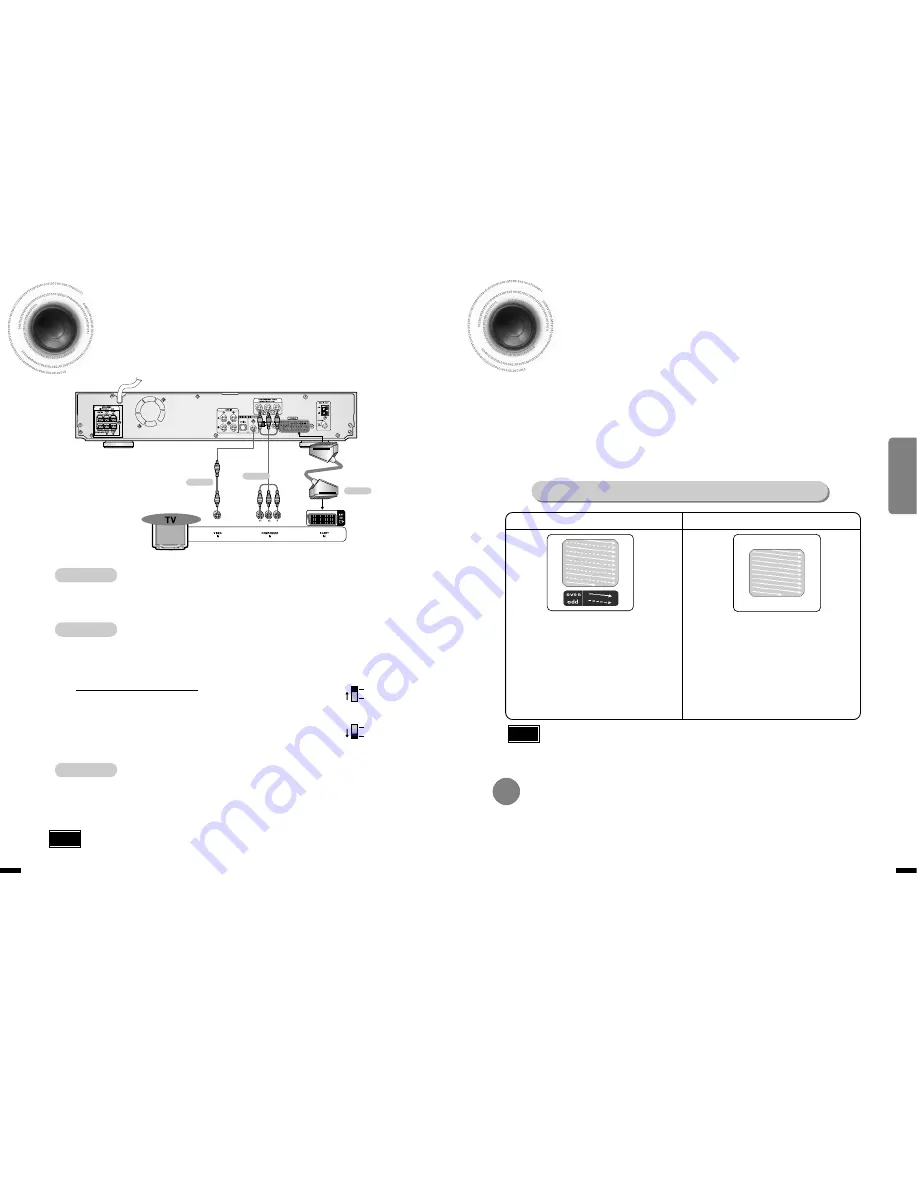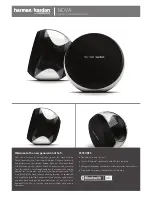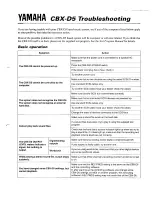
13
CONNECTIONS
14
Connecting the Video Out to TV
METHOD 2
Scart ...............
Better Quality
If you television is equipped with an SCART input, connect an Scart Jack (not supplied)
from the AV OUT jack on the back panel of the system to the SCART IN jack on your televi-
sion.
METHOD 1
Composite Video ...............
Good Quality
Connect the supplied video cable from the VIDEO OUT jack on the back panel of the sys-
tem to the VIDEO IN jack on your television.
METHOD 3
Component (Progressive Scan) Video ...............
Best Quality
If your television is equipped with Component Video inputs, connect a component video
cable (not supplied) from the Pr, Pb and Y jacks on the back panel of the system to the cor-
responding jacks on your television.
•
When the Progressive scan mode is selected, the VIDEO and SCART outputs
do not feed any signal. See page 14 to select Progressive Scan.
Note
For using the SCART cable
• If Scart is equipped for your TV, set RGB-COMPOSITE selector
of the center unit to RGB. You can get a better picture quality by
using Scart setting.
• If Scart (RGB Input) is not equipped for your TV,
set RGB-COMPOSITE selector to COMPOSITE.
COMPOSITE
RGB
COMPOSITE
RGB
Make sure that turn off and disconnect the plug from outlet before moving or installing the product.
In connecting to video, select one of following three methods that suits for TV and connect it.
METHOD 1
METHOD 3
METHOD 2
P.SCAN
(Progressive Scan)
Function
Unlike regular Interlace Scan, in which two fields of picture information alternate to create the
entire picture (odd scan lines, then even scan lines), Progressive Scan uses one field of infor-
mation (all lines displayed in one pass) to create a clear and detailed picture without visible
scan lines.
Press and hold P.SCAN button on the remote controller for over 5 seconds in
stop mode.
•
"
P.SCAN
" or "
I.SCAN
" will appear in the display.
At this time, press the P.SCAN button shortly to select between "
P.SCAN
" and "
I.SCAN
".
In interlaced-scan video, a frame consists of two inter-
laced fields (odd and even), where each field contains
every other horizontal line in the frame.
The odd field of alternating lines is displayed first, and
then the even field is displayed to fill in the alternating
gaps left by the odd field to form a single frame.
One frame, displayed every 1/30th of a second, contains
two interfaced fields, thus a total of 60 fields are dis-
played every 1/60th of a second.
The interlaced scanning method is intended for capturing
a still object.
Interlaced Scan (1 FRAME = 2 FIELDS)
The progressive scanning method scans one full frame of
video consecutively down the screen, line by line.
An entire image is drawn at one time, as opposed to the
interlaced scanning process by which a video image is
drawn in a series of passes.
The progressive scanning method is desirable for dealing
with moving objects.
Progressive Scan (FULL FRAME)
What is Progressive (or Non-Interlaced) Scanning?
•
This function works only on TVs equipped with component video inputs (Y, Pr, Pb) that support
Progressive Video. (It does not work on TVs with conventional component inputs, i.e., non-progressive
scan TVs.)
•
Depending on the brand and model of your TV, this function may not work.
Note
Press and hold NTSC/PAL button on the remote controller for over 5 seconds while the power is turned off.
•
"
NTSC
" or "
PAL
" will appear in the display.
At this time, press the NTSC/PAL button shortly to select between "NTSC" and "PAL".
•
Each country has a different video format standard.
•
For normal playback, the video format of the disc must be the same as the video format of your TV.
Selecting the Video Format









































